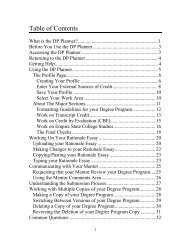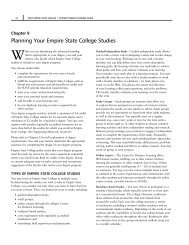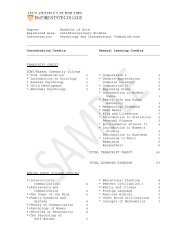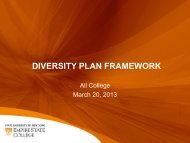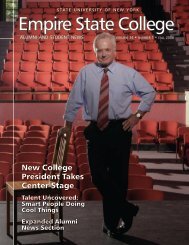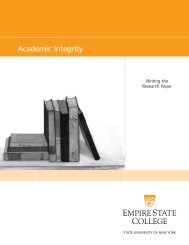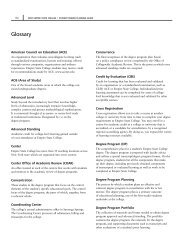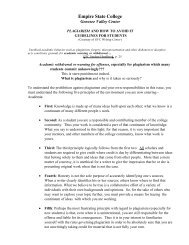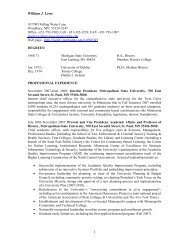Academic Plan 2011-2015 (PDF 524kB) - SUNY Empire State College
Academic Plan 2011-2015 (PDF 524kB) - SUNY Empire State College
Academic Plan 2011-2015 (PDF 524kB) - SUNY Empire State College
You also want an ePaper? Increase the reach of your titles
YUMPU automatically turns print PDFs into web optimized ePapers that Google loves.
44 <strong>SUNY</strong> <strong>Empire</strong> <strong>State</strong> <strong>College</strong>: <strong>Academic</strong> <strong>Plan</strong> <strong>2011</strong> - <strong>2015</strong>in its description of its educational objectives (“an educated person” – see the following for more).Finally, an even more definitive indication that the college takes this theme seriously would be if eachset of undergraduate Area of Study Guidelines included the expectation that each student includea study of it in their concentration.RationaleThe college should make environmental sustainability one of the central themes of its academicprogram, for several interrelated reasons:First, it is generally agreed that the world faces unprecedented environmental problems. Whateverside one wishes to take on the many debates about those problems, they still pose challenges to theworld that will require the thought and action of all citizens – but especially of educated citizens –who need to have at least a basic understanding of those issues in order to participate in theformulation of action plans.Second, as David Orr has pointed out in his writings, when education and educators communicatesubject matter, it says as much about the importance of what is left out as it does about what isincluded. At present, by saying little beyond what ecology courses and a small number of other coursescontain, most college programs say to their students that environmental problems are unimportant.Most disciplines present themselves as if the wider natural world has nothing to do with their subjectmatter, yet that is very far from true. (See previous Scope section.)Third, this college advocates lifelong learning and celebrates the connections our students makebetween their studies and the larger world. Yet in the face of massive environmental challenges, we donot ask them to begin, or continue, creating a foundation of knowledge of these vital aspects of 21stcentury existence, or to connect their other studies with sustainability issues.Fourth, these are issues that pervade every aspect of existence. If we humans do not attend toenvironmental issues in a committed, serious way, all of society and nature are threatened, therebythreatening the very contexts in which to address those other issues. For confirmation, one need onlylook at the moderate – as opposed to the radical – projections about the effects of global climatechange to see how the world will change. A related point is that almost all social issues connect directlyto environmental ones. For example, it will be the disadvantaged and disenfranchised who will sufferfirst – and likely the most – from environmental disaster; so justice issues are included very definitely inwhat we mean by environmental issues. Even if one disagrees with this scenario, it remains necessaryfor our students to become informed about its multiple facets in order to enter the debates – whetherglobal or local – in an informed manner.Finally, the college is a member of the Association for the Advancement of Sustainability in HigherEducation (AASHE), and President Davis is a signatory of the American <strong>College</strong> and UniversityPresidents’ Climate Commitment (ACUPCC). Both of those memberships commit the college not onlyto reducing the environmental impact of its far-flung operations, but also to increasing its academicenvironmental sustainability offerings.



